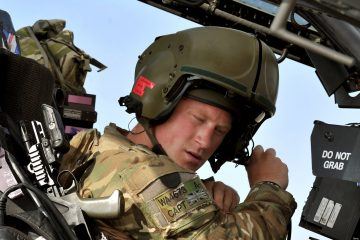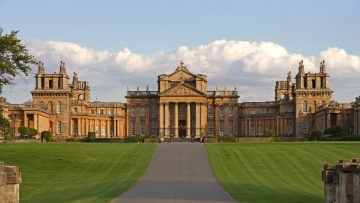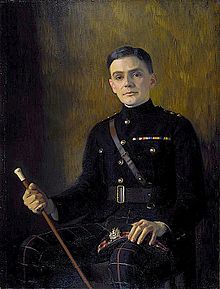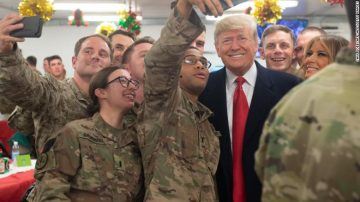by Robert Fay

Being American, as well as a Gen X-er who grew up on the lyrics of the Sex Pistols, “God save the queen…she’s not a human being,” I never quite understand the U.K.’s loyalty to the British Royal family. Up through the Edwardian era, aristocratic veneration made sense in many ways, but the horror and folly of World War I should have thoroughly wrung that ancient habit from the English soul. But a young Queen Elizabeth took the reins in 1952, and proved an admirable monarch, and then Princess Diana arrived two over decades later adding a much-needed bit of Hollywood glamour to the House of Windsor. But I still didn’t pay the Royals any mind until I discovered a video of Prince Harry in a firefight with Taliban gunmen in Afghanistan.
Now this was interesting, I thought. Here was one of the world’s most privileged, poshest individuals and he was in Helmand Province, arguably one of the most dangerous places on earth in 2008.
I assumed it had been some kind of publicity event, until I did some research and found out Prince Harry had actually attended Royal Military College Sandhurst, the officer candidate school for British Army officers, that is six-months long, and has a solid reputation for toughness and professionalism. Prince Harry went on to serve as a Forward Air Controller in Afghanistan in 2008 and then as an Apache fighter pilot, also seeing action in Afghanistan in 2012. He was the real deal.
Historically, the officer class of British and European militaries had been peopled exclusively with members of the aristocracy. The officer/enlisted man split had originally represented the class segregation between aristocrats and the lower classes, who naturally filled out the army’s soldiering ranks. But in today’s world, the wealthy and influential are no longer expected to serve in the military. President Donald Trump grew up the son of a wealthy real estate developer. He likes to use military rhetoric, but he chose not to serve in the Vietnam War. His two privileged sons, Donald Trump Jr. and Eric Trump, also did not serve in the military. And none of the last three British Prime Ministers: Theresa May, David Cameron or Gordon Brown possess any military service.
We cannot mention Sandhurst and U.K. Prime Ministers without giving a nod to dear old Winston Churchill, who was a direct descendant of the Dukes of Marlborough and was born in Blenheim Palace—now that’s a palace!—and spent many years of his life on the field of battle. Most of Winston’s life achievement are well known, yet there is curious and admirable episode during World War I that doesn’t get the attention it deserves.

Winston was a much-decorated young junior officer and civilian war reporter in Egypt, Afghanistan and the Boer War in South Africa. His exploits during the turn-of-the century are well documented, but during World War I he was First Lord of the Admiralty (equivalent to U.S. Secretary of the Navy) and was forced to resign in 1915 when the Dardanelles campaign (present day Turkey) went bad, resulting in the deaths of many Commonwealth troops. Churchill was distraught. His country was at war and he was now relegated to the sidelines. So what did he do? He lobbied his friends in the Army to return to active military service and go to the trenches to fight. He was 41-years-old, a recent cabinet member and now he wanted to go shoot Germans. He got his wish.
Churchill was given the rank of Lt. Colonel, put in charge of a battalion of the Sixth Royal Scots Fusiliers, and given a section of trench line in France to defend. He spent three months at the front, and according to Royal Scotts officer Hakewell Smith, Churchill “would often go into no-man’s land. It was a nerve-racking experience to go with him. He would yell out in his loud gruff voice—far too loud it seemed to us—‘You go this way, I will go this way…Come here, I have found a gap in the German wire. Come over here at once.’” Hakewill Smith also noted that Churchill “never fell when a shell went off; he never ducked when a bullet went past with its loud crack.”
Today, it’s unthinkable that a middle-age British or U.S. cabinet member would volunteer to lead men and women in battle in Afghanistan or Syria. They like to give orders from comfortable conference rooms, but are generally not willing to personally face the danger of battle.
The famed translator of Marcel Proust In Search of Lost Time, C.K. Scott Moncrieff wasn’t from an aristocratic British family, but the Moncrieffs were comfortable and he went to super-posh Winchester College—a privileged boarding school for high-school age children—where in 1903 when Moncrieff enrolled, “there were members of ruling families like the Asquiths and others admitted to Edward VII’s royal set,” according to Jean Findlay in Chasing Lost Time: The Life of C.K. Scott Moncrieff (2014).
Moncrieff was homosexual, literary and an artist in his own right—his translations of Proust stands as a singular artistic achievements; unforgettable interpretive translations whereby Proust’s French was filtered through Moncrieff’s soul and then presented in highly-stylized English. But Moncrieff was not just an aesthete, he also proved to be a tenacious, aggressive commander of combat troops in World War I. He was commissioned in 1914 and served as a junior officer in the Kings Own Scottish Borderers on the Western Front from 1914 to 1917.

His men loved him, one of them wrote, “Captain Scott Moncrieff was adored and respected by every man, not only his own Company but in the Battalion and it is curious indeed when I learn he only possessed the MC when, if ever a man earned the VC, Captain Scott Moncrieff earned it over and over again…” Another of his men, Lance Corporal William Buchanan wrote, “I can see him strolling about No Man’s Land as cool as if he were on the parade ground, seeking information and the position of the enemy…On one occasion he brought back, as a souvenir, a German sandbag.”
The tradition of society’s comfortable sons going to war used to be a continent-wide phenomenon, and includes the marvelous example of the 20th Century’s greatest philosopher, Ludwig Wittgenstein, who served with distinction in the Austrian-Hungarian army during World War I (though, curiously, he began as an enlisted man) and served on the Eastern Front in an artillery regiment fighting the Russians, where he was eventually promoted to non-commissioned officer, and eventually was sent for officer training and become a lieutenant.
Wittgenstein was the son of one of the wealthiest industrialists in Vienna, and from a family that was one of the richest in Europe at the time. The composer Johannes Brahmas was a friend of the family, and would perform in their mansion. By 1913, Wittgenstein had already studied at Cambridge under Bertrand Russell, and was rightly pegged as a “rising star” in the philosophy game. Before the war, he went to Denmark and spent many days at a remote cabin reading Søren Kierkegaard and working on Notes on Logic, the work that preceded his most famous book, Tractatus Logico-Philosophicus. When war was declared, he immediately went home to enlist. He later claimed that “the war had saved him” from the various dark, existential tunnels he’d been exploring.
According to his biographer Ray Monk in Wittgenstein: The Duty of Genius (1990), “Once at the front line he asked to be assigned to the most dangerous of places, the observation post. This guaranteed that he would be the target of enemy fire.” And as the fighting continued, Monk notes, “During the first few days of the Brusilov Offensive he was recommended for a decoration in recognition of the bravery in keeping his post, despite several times being told to take cover.”
Of the many ills that now plague western society today, one of the least discussed is the paucity of leadership. There are nearly infinite ways to analyze why the social contract in the U.S. and U.K. is fraying, but one of the them is certainly decades of weak, ineffectual and cowardly leaders. If the U.S. had had strong leaders in the decades leading up to 2016, it’s likely voters would have seen Donald Trump for the carnival barker he is. The same goes for the populist politicians in the U.K. that sold Brexit to the Brits. If you’ve had, and seen the real McCoy, you’re more likely to spot the charlatans.

The fascinating thing today—Prince Harry excepted—is that the privileged individuals who most benefit from the current “state of things,” are the ones who seem least interested in sacrificing for it. This should be a warning bell for all of us. If the grand cathedral of hyper capitalism and devotional consumerism is so fantastic, so precious, it would seem that the members of the Trump family would be the first to step forward and defend it. Churchill loved the British Empire and all its colonial holdings. The Empire represented Queen Victoria and his family’s legacy and Blenheim and he believed it was worth fighting for and dying for.
Churchill and this brand of patriotism is quite unfashionable now, but wars continue to be ordered up like fast food, and today’s elite feel absolutely no responsibility to lead the working classes and the underprivileged—the men and women still fill out the soldiering ranks—into wars that are supposedly about our way of life.
If the Trumps won’t take a bullet for this system, it might be worth wondering, then who the hell should?
Robert Fay’s essays, reviews and stories have appeared in The Atlantic, The Millions, The Los Angeles Review of Books and The Chicago Quarterly Review, among others. He is co-creator of the Feeling Bookish Podcast. Follow him on Twitter @RobertFay1.
